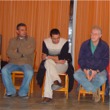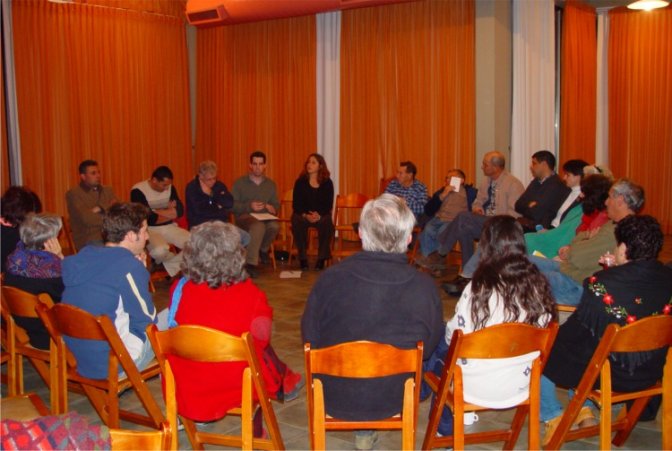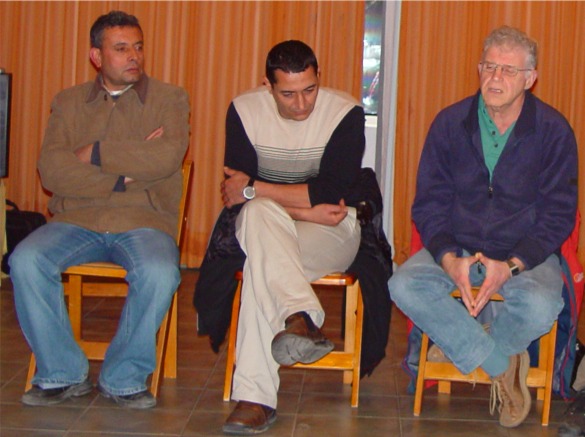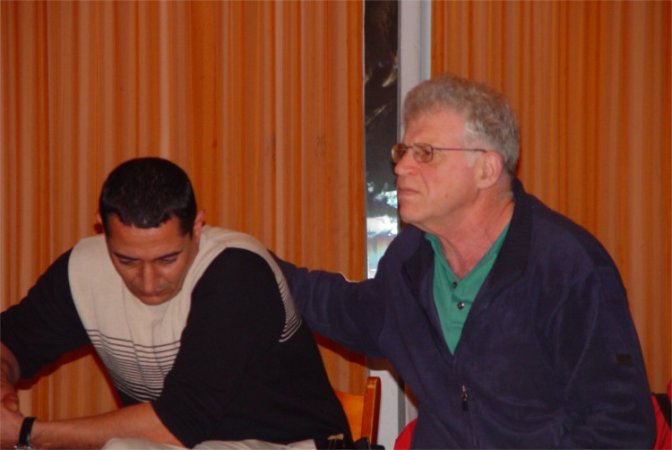Home > Oasis of Peace > Projects & Outreach > Doumia-Sakinah: The Pluralistic Spiritual Centre > Introducing the Parents’ Circle / Families Forum
Introducing the Parents’ Circle / Families Forum
Monday 24 January 2005
All the versions of this article: [عربي] [English] [עברית]

In cooperation with the Parents’ Circle / Families Forum, Doumia Sakinah opened the first of a series of meetings known as Truth and Reconciliation by inviting the members of the Forum to describe the work of the Forum.
Truth and Reconciliation will explore, in a sociological and psychological manner, the possibilities for a process of reconciliation that would be accompanied by future political agreements in the region. In this framework, we will try to propose a model for discussion on the subject of truth and reconciliation between Arabs and Jews within Israel and between Palestinians and Israelis.
This first evening gave members of the Forum the opportunity to describe their educational work and discuss ideas fundamental to the Forum’s work for reconciliation and peace.
The evening started with a presentations by two Palestinian and one Jewish member of the Forum. Their personal stories, involving the loss of near relations, are the motivating factor in their work for the Forum. In their educational work with schools, the Israeli and Palestinian members of the Forum tell personal stories of loss and bereavement before opening a discussion. In 2004, the members of the forum visited 870 schools in Israel and East Jerusalem. This year they hope that it will be possible to enter also schools in the West Bank.
Aharon – the Jewish representative – opened with his story of personal tragedy: His son was killed as a soldier in Lebanon – this had happened just a few days before his scheduled release. On his uniform had been the button of an Israeli peace organization that called for a withdrawal from Lebanon. Aharon said that following this trauma of deep personal loss, only the struggle for peace gives him some sense of meaning. "I am working for a future in which no more families will have to suffer the same loss."
Although Aharon had been active in promoting the exit of Israeli forces from Lebanon also beforehand, he found that as a bereaved parent, people were more willing to listen, out of sympathy and respect. He added that it may be that the Forum is using bereavement as a tool, but that the purpose was important enough to justify this.
The two Palestinian representatives, Wajieh and Haled, also told stories of personal tragedy involving the loss of close family members. Wajieh lost his brother, when he was shot by soldiers in 1990 and in the ensuing years he lost three other family members who were killed by settlers.
Haled lost his 31-year old brother, who was also shot by a soldier. Five months later, his 14-year old brother was also shot by a soldier. Both deaths had occurred without provocation or identifiable motive.
Haled himself, as well as the brother who was killed, had been jailed during the first Intifada for resisting the occupation. Following his release, he was barred from returning to his job as a school teacher.
When Israeli members of the Forum approached him to join, Haled at first was not interested. He received them in his home only because they spoke in favour of peace.
However, when the visitors began to tell their own experiences, it was as if for the same time other people were putting into words what he himself felt.
Inspired by this feeling of affinity with people on both sides of the conflict, Haled joined the Forum and began to take part in its educational work. “The army denied me my vocation as an educator, but the Forum gave me a second chance."
In the discussion that took place the families expressed their appreciation for the “sacred work” of the Forum which manages to reach out to the public while speaking to their sensitivities. In many cases they are able to soften or calm feelings of anger and revenge by the personal example they give as those who were the direct victims of the hostilities between the two peoples.
In order to illustrate the transformation that can happen through personal experience, Haled told of an incident in which he was taken from his home by soldiers and beaten all the way to the detention centre. A soldier who had witnessed what happened apologized to Haled with tears in his eyes. “In one instant, says Haled, I forgot all about the blows I’d received and was only aware of this human contact."
"From these things and many others that I experienced, I learned that peace will not arrive only with the help of leaders – it depends upon the ability of people on both sides to reconcile."
Members of the Forum spoke of the importance of spreading the message to a broader public also through the media. The production of a TV series is being considered that would be based on personal stories of Forum members, but employ professional actors.
Members of the Forum emphasize that their message is not political and does not favour one party over another. This is not to say that the Forum members have to give up their political identity (or, for that matter, their national and cultural identity. However, in their work as educators, they emphasize the common destiny and the wish of Israeli and Palestinian members of the Forum to stop the violence and prevent the suffering of additional people and families.





